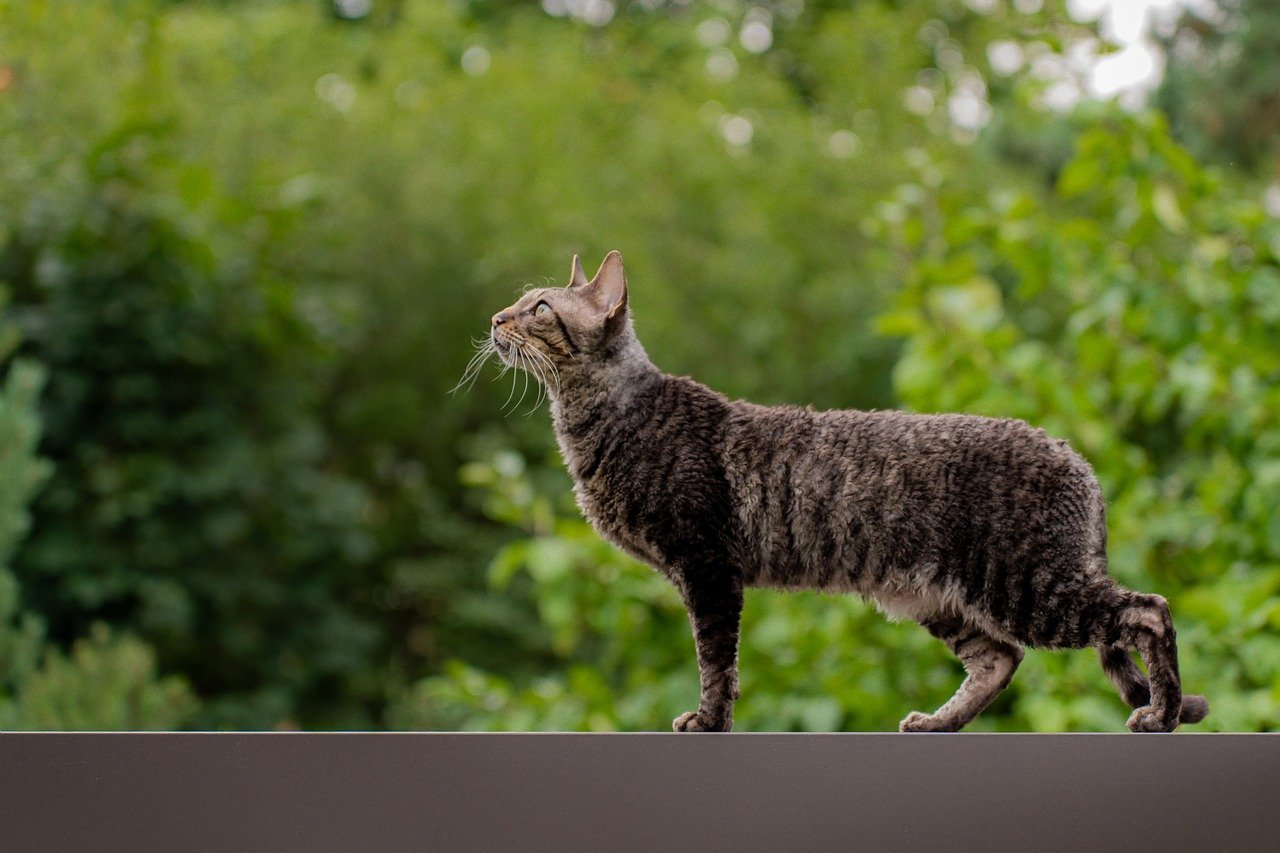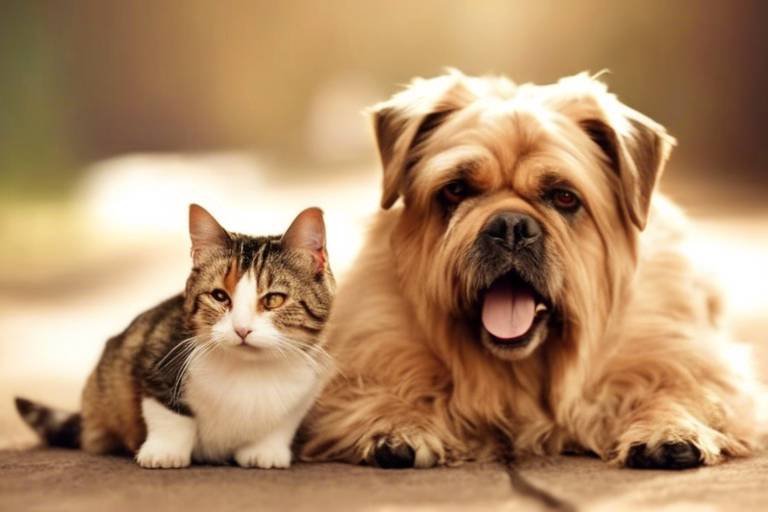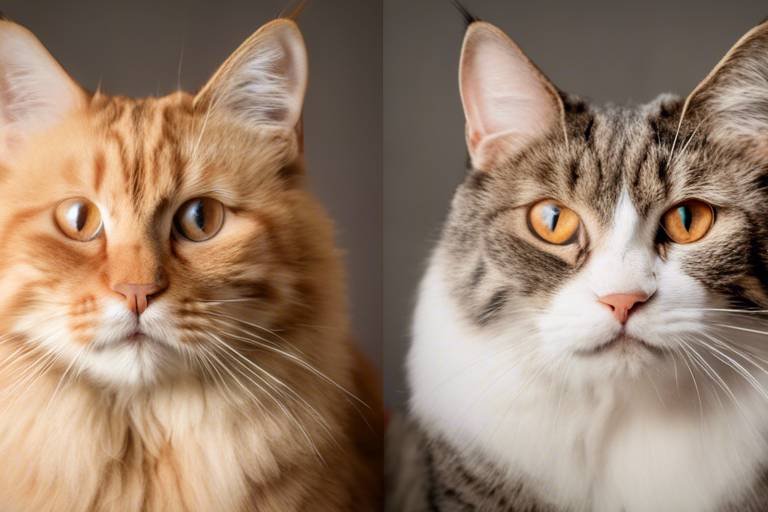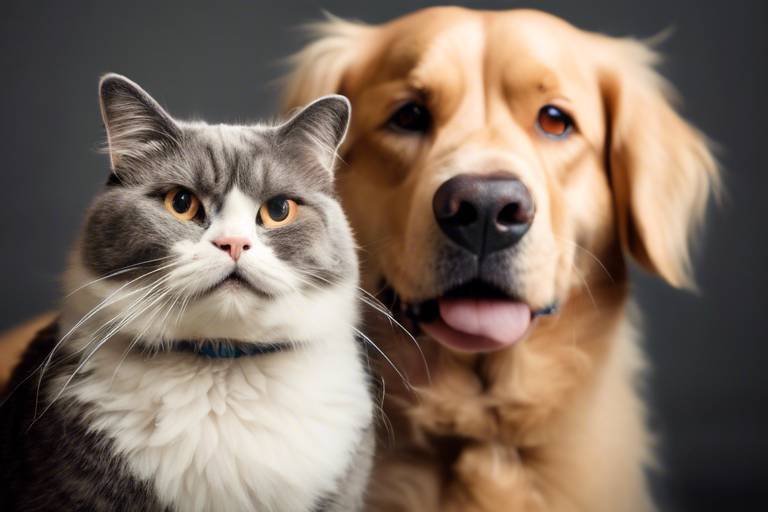The Best Treats for Senior Pets - What to Look For
As our beloved furry companions age, their nutritional needs change significantly. It's essential to ensure that the treats we choose for them not only satisfy their taste buds but also support their health and well-being. Senior pets can be just as playful and loving as their younger counterparts, but they require special attention to their dietary needs to enjoy their golden years. So, what should you look for when selecting treats for your senior pet? Let’s dive into the essential factors that will help you make informed choices!
Senior pets often face various health challenges, such as reduced energy levels, dental issues, and digestive problems. This means that their diets should be tailored to meet these unique requirements. For instance, older pets may benefit from a diet lower in calories but higher in fiber to maintain a healthy weight and support digestion. Additionally, incorporating more easily digestible proteins can help keep their muscles strong without overburdening their systems. Think of it like swapping out a heavy meal for a lighter, more nutritious option that still fills you up!
When selecting treats for senior pets, it’s crucial to focus on key ingredients that promote health. Look for treats that are rich in high-quality protein, as protein is vital for muscle maintenance and overall vitality. Fiber is another important component, aiding digestion and helping to keep your pet's gut healthy. Essential vitamins and minerals should also be included to support their immune system and overall health. So, when browsing the pet aisle, keep an eye out for these vital ingredients!
High-quality protein sources are essential for senior pets. Lean meats like chicken, turkey, and fish are excellent choices, as they provide the necessary amino acids without excessive fat. Fish, in particular, is rich in omega-3 fatty acids, which can help reduce inflammation and support joint health. Think of protein as the building blocks that keep your pet strong and active, even in their later years!
When considering protein sources, it’s important to understand the differences between animal and plant proteins. While animal proteins offer complete amino acid profiles, plant proteins can be beneficial too, especially for pets with specific dietary restrictions. For example, lentils and peas can provide valuable nutrients while being easier on the digestive system. It’s all about balance—ensuring your senior pet gets the right mix of both types of protein for optimal health.
Not all proteins are created equal! The quality of the protein in your pet's treats can significantly impact their health. High-quality protein sources will enhance your senior pet's energy levels and overall vitality, making them feel more youthful and spry. Look for treats that specify the source of their protein, such as "real chicken" or "salmon meal" rather than vague terms like "meat by-products." This attention to detail can make all the difference in your pet's diet.
Fiber plays a crucial role in maintaining digestive health in senior pets. As they age, their digestive systems may slow down, leading to constipation or other gastrointestinal issues. Treats that are high in fiber can help promote regular bowel movements and support a healthy gut. Ingredients like sweet potatoes, pumpkin, and oats are great sources of fiber that can be beneficial for your furry friend.
While it’s important to focus on what to include in your senior pet’s diet, it’s equally crucial to avoid harmful ingredients. Many commercial pet treats contain artificial additives, fillers, and allergens that can negatively impact your pet's health. Always read the ingredient list carefully and steer clear of treats that contain artificial colors, flavors, or preservatives.
Senior pets may develop sensitivities or allergies to certain ingredients over time. Common allergens include grains, dairy, and certain proteins like beef or chicken. If your pet has a history of allergies, consider opting for hypoallergenic treats made with limited ingredients. This approach can help you avoid triggering any adverse reactions while still providing tasty options for your pet.
Artificial additives can pose significant risks to your senior pet's health. These substances may contribute to long-term health issues and should be avoided whenever possible. Instead, look for natural, preservative-free options that are made with wholesome ingredients. Your pet deserves the best, and choosing treats that are as close to nature as possible will support their health and happiness.
Making homemade treats for your senior pet can be a rewarding experience! Not only do you have complete control over the ingredients, but you can tailor the treats to meet your pet’s specific dietary needs. Plus, there’s something special about knowing exactly what goes into your pet's food. Homemade treats can be simple to prepare and can often be more nutritious than store-bought options.
Here’s a quick and easy recipe for a homemade treat that your senior pet will love:
Ingredients: - 1 cup of pumpkin puree - 2 cups of oat flour - 1 egg - 1/2 teaspoon of cinnamon Instructions: 1. Preheat your oven to 350°F (175°C). 2. Mix all ingredients in a bowl until well combined. 3. Roll out the dough and cut it into shapes. 4. Bake for 20-25 minutes until golden brown. 5. Allow to cool before serving to your pet!
If your senior pet has specific dietary restrictions, don't hesitate to make ingredient substitutions in your homemade treats. For example, if your pet is sensitive to wheat, you can use almond flour or coconut flour instead of regular flour. This flexibility allows you to create delicious and safe treats that cater to your pet's needs.
Before making any significant changes to your senior pet’s diet, it’s always a good idea to consult with a veterinarian. They can provide personalized advice based on your pet’s health conditions and dietary needs. This ensures that the treats you choose align with their overall health strategy, keeping your furry friend happy and healthy!
- What are the best treats for senior pets? Look for treats high in protein, fiber, and essential vitamins, while avoiding harmful additives.
- Can I give my senior pet homemade treats? Absolutely! Homemade treats can be healthier and tailored to your pet’s specific needs.
- How do I know if my pet has food allergies? Watch for symptoms like itching, digestive upset, or changes in behavior after eating certain foods.
- Should I consult my vet before changing my pet’s diet? Yes, your vet can provide valuable guidance based on your pet's health history.

Understanding Senior Pet Nutrition
As our furry companions age, their nutritional needs undergo significant changes. Just like humans, senior pets require a tailored diet that supports their health and well-being in their golden years. It's essential to understand that their metabolism slows down, and their bodies may not absorb nutrients as efficiently as they did in their youth. This means that what worked for them as energetic puppies or kittens might not be suitable now. So, what should you look for in senior pet nutrition? Let's dive into the key aspects that will help keep your older pet healthy and happy.
First and foremost, protein plays a pivotal role in maintaining muscle mass and overall health. Senior pets often experience muscle loss, so incorporating high-quality protein sources into their diet can help combat this issue. It's not just about the quantity of protein; the quality matters too. Lean meats, fish, and eggs are excellent sources that provide the essential amino acids needed for muscle maintenance.
Next, we can't overlook the importance of fiber. As pets age, their digestive systems may become less efficient, leading to issues like constipation. That's where fiber comes in! It aids in digestion and promotes a healthy gut, which is crucial for overall health. Foods rich in fiber, such as pumpkin, sweet potatoes, and certain grains, can help keep your senior pet's digestive system running smoothly.
Moreover, senior pets often require specific vitamins and minerals to support their aging bodies. Nutrients like omega-3 fatty acids can help reduce inflammation and promote joint health, while antioxidants can combat oxidative stress. These nutrients can be found in fish oil, blueberries, and leafy greens, making it easier to incorporate them into your pet's diet.
It's also essential to consider any health conditions your senior pet may have. For instance, pets with kidney issues may need lower protein levels, while those with arthritis might benefit from joint supplements. Therefore, always consult with your veterinarian to tailor a diet that meets your senior pet's unique needs.
In summary, understanding senior pet nutrition is about recognizing their changing needs and adapting their diet accordingly. By focusing on high-quality protein, sufficient fiber, essential vitamins, and addressing any specific health concerns, you can help ensure your furry friend enjoys a happy and healthy life as they age.

Key Ingredients to Look For
When it comes to selecting treats for our beloved senior pets, it’s crucial to focus on the key ingredients that can significantly enhance their health and well-being. Older pets often have different nutritional needs compared to their younger counterparts, and understanding these needs can help you make informed choices. The right treats can not only satisfy their taste buds but also support their overall health. So, what should you look for?
First and foremost, protein is a vital component of any senior pet's diet. As pets age, they tend to lose muscle mass, making it essential to provide them with high-quality protein sources that help maintain their muscle strength. Look for treats that list real meat, such as chicken, turkey, or fish, as the first ingredient. The quality of protein is just as important as the quantity, so opt for treats that emphasize lean meats and fish.
Next up is fiber. Senior pets often deal with digestive issues, and fiber plays a crucial role in promoting healthy digestion. It helps regulate bowel movements and can prevent constipation, which is a common problem in older pets. Treats that include ingredients like sweet potatoes, pumpkin, or oats can provide the necessary fiber to support your pet's digestive health. When selecting treats, consider those that offer a balance of soluble and insoluble fiber for optimal gut health.
Additionally, essential vitamins and minerals are critical for senior pets. Look for treats fortified with antioxidants, such as vitamins E and C, which can help combat oxidative stress and inflammation. Omega-3 fatty acids are also beneficial for maintaining healthy skin and coat, as well as supporting joint health. Ingredients like fish oil or flaxseed can be excellent sources of these essential fatty acids.
Here’s a quick overview of the key ingredients to look for in senior pet treats:
| Ingredient | Benefits |
|---|---|
| High-Quality Protein | Supports muscle maintenance and overall health |
| Fiber | Promotes healthy digestion and prevents constipation |
| Vitamins & Minerals | Boosts immune function and combats oxidative stress |
| Omega-3 Fatty Acids | Supports skin health and joint function |
In conclusion, when choosing treats for your senior pet, always prioritize high-quality ingredients that cater to their specific health needs. By focusing on protein, fiber, and essential vitamins, you can help ensure that your furry friend enjoys their golden years with vitality and joy. Remember, the right treats can make a world of difference in their health and happiness!
Protein Sources
When it comes to selecting the best treats for your senior pets, protein is a fundamental building block that cannot be overlooked. As pets age, their bodies require a different balance of nutrients to maintain energy levels and support muscle health. This is where high-quality protein sources come into play. Lean meats such as chicken, turkey, and fish are excellent options, as they provide essential amino acids that help in muscle maintenance and overall vitality. Think of protein as the fuel that keeps your pet's engine running smoothly, especially in their golden years.
But why are these specific protein sources so beneficial? For starters, lean meats are generally lower in fat, which can help combat obesity—a common concern for senior pets. Fish, on the other hand, is rich in omega-3 fatty acids, which have anti-inflammatory properties and can support joint health. Imagine your pet moving with the agility of a puppy again, all thanks to the right protein choices!
It's also essential to consider the quality of the protein. Not all protein is created equal, and the source matters significantly. High-quality protein sources, such as those derived from animal meats, are more easily digestible and provide a complete amino acid profile. This means your pet can absorb and utilize the nutrients more efficiently, leading to improved energy levels and overall health. In contrast, lower-quality proteins, often found in some commercial pet treats, may not provide the same benefits and could even lead to health issues.
Additionally, you might wonder about the differences between animal and plant proteins. While animal proteins are generally more complete, plant proteins can still play a role in your pet's diet, especially when combined correctly. For instance, legumes and certain grains can complement animal proteins to ensure a balanced intake. However, it's crucial to monitor your senior pet's reaction to these proteins, as some may have sensitivities or allergies. Always consult with your veterinarian to find the best protein sources tailored to your pet's specific needs.
In summary, focusing on high-quality protein sources such as lean meats and fish not only enhances your senior pet's diet but also contributes to their happiness and longevity. Remember, the right protein can make a world of difference, allowing your furry friend to enjoy their golden years with vigor and joy!
- What is the best protein for senior pets? Lean meats like chicken, turkey, and fish are ideal due to their digestibility and nutrient content.
- Can senior pets eat plant-based proteins? Yes, but they should be combined with animal proteins to ensure a complete amino acid profile.
- How can I tell if my pet is getting enough protein? Look for signs such as energy levels, muscle tone, and overall health; consult your vet for tailored advice.
Animal vs. Plant Protein
When it comes to feeding our senior pets, understanding the difference between animal and plant proteins is crucial. Both types of protein can play a role in a balanced diet, but they have distinct characteristics that can affect your pet's health. Animal proteins, sourced from meat, fish, and eggs, are considered complete proteins because they contain all the essential amino acids that pets need for muscle maintenance and overall health. For senior pets, these proteins are vital as they help combat the natural decline in muscle mass that occurs with aging.
On the other hand, plant proteins, which come from sources like soy, peas, and lentils, can also contribute to a pet's nutritional needs, but they often lack one or more essential amino acids. This means that while they can be a great supplement to a diet, they should not be the sole source of protein for senior pets. The key is to find a balance. For instance, combining animal and plant proteins can provide a well-rounded amino acid profile, ensuring your furry friend gets the best of both worlds.
It's also important to consider the digestibility of these proteins. Animal proteins are generally more easily digested by pets, especially older ones with sensitive stomachs. In contrast, some senior pets may have difficulty digesting certain plant proteins, which could lead to gastrointestinal issues. Therefore, when selecting treats or food, look for those that prioritize high-quality animal protein sources, such as:
- Chicken
- Turkey
- Fish
- Beef
In summary, while plant proteins can be beneficial, they should complement rather than replace animal proteins in a senior pet's diet. Always keep an eye on how your pet reacts to different protein sources and consult with your veterinarian to tailor their diet to their specific needs.
Q: Can senior pets thrive on a plant-based diet?
A: While some senior pets can thrive on a plant-based diet, it is essential to ensure they receive all necessary amino acids. Consulting with a veterinarian is crucial to tailor their diet appropriately.
Q: How can I tell if my pet is getting enough protein?
A: Signs of insufficient protein may include weight loss, decreased energy levels, or muscle wasting. Regular check-ups with your veterinarian can help monitor your pet's protein intake and overall health.
Q: Are there any risks associated with high protein diets for senior pets?
A: High protein diets can be beneficial, but they may not be suitable for pets with certain health conditions, such as kidney disease. Always consult your veterinarian to determine the best dietary plan for your senior pet.
Protein Quality
When it comes to your senior pet's diet, plays a pivotal role in maintaining their overall health and vitality. It's not just about the quantity of protein; the source and quality of that protein are crucial for ensuring your furry friend receives the essential amino acids they need for muscle maintenance and energy. Think of protein as the building blocks of your pet's body—just like a sturdy house needs quality bricks to stand tall, your pet needs high-quality protein to thrive.
High-quality protein sources, such as lean meats and fish, are packed with essential nutrients that can significantly enhance your senior pet's energy levels. For example, chicken, turkey, and salmon are excellent choices that provide not only protein but also omega-3 fatty acids, which are beneficial for joint health and cognitive function. In contrast, lower-quality protein sources, often found in cheaper pet foods, may contain fillers or by-products that offer little nutritional value. These can lead to a range of health issues, including obesity, poor coat condition, and even digestive problems.
To help you understand the differences in protein quality, consider the following table that compares high-quality protein sources with lower-quality options:
| Protein Source | Quality Rating | Benefits |
|---|---|---|
| Chicken | High | Lean protein, rich in essential amino acids |
| Salmon | High | Omega-3 fatty acids, promotes healthy skin and coat |
| Beef By-Products | Low | May contain unhealthy fillers, low nutritional value |
| Plant Proteins (e.g., soy) | Variable | Can be beneficial but often lack essential amino acids |
It's essential to read the ingredient labels carefully when choosing treats for your senior pet. Look for specific protein sources rather than vague terms like "meat meal" or "by-products." The more specific the source, the better the quality. Additionally, consider the protein's digestibility; high-quality proteins are easier for your pet to digest, ensuring they absorb all the nutrients they need.
In summary, focusing on is vital for your senior pet's health. By selecting high-quality protein sources, you are not only supporting their physical health but also enhancing their quality of life in their golden years. Remember, a healthy pet is a happy pet, and investing in their nutrition now can lead to a longer, more vibrant life together.
- What are the signs of poor protein quality in pet food? Look for signs like low energy, dull coat, and digestive issues.
- Can senior pets digest plant proteins? While some can, animal proteins are generally more digestible and provide essential amino acids.
- How can I tell if a protein source is high quality? Check for specific meat sources listed in the ingredients and avoid vague terms.
- Is homemade pet food a better option for senior pets? It can be, as you have control over the ingredients, but always consult your vet for balanced nutrition.
Fiber and Digestive Health
When it comes to the health of our senior pets, fiber plays a crucial role in maintaining digestive health. As pets age, their digestive systems can become less efficient, leading to issues such as constipation or irregular bowel movements. This is where fiber steps in as a dietary hero! It acts like a broom, sweeping through the intestines and ensuring everything runs smoothly. But what exactly does fiber do for our elderly companions?
Fiber is essentially a type of carbohydrate that the body cannot digest. It comes in two forms: soluble and insoluble. Soluble fiber dissolves in water and can help manage blood sugar levels, while insoluble fiber adds bulk to the stool and aids in moving food through the digestive tract. For senior pets, a combination of both types is ideal. This not only helps maintain a healthy weight but also supports overall gut health, which is vital for their well-being.
Incorporating fiber into your senior pet's diet can help prevent various digestive problems. For instance, fiber-rich foods can:
- Promote Regularity: By adding bulk to the stool, fiber can help prevent constipation, a common issue in older pets.
- Support Healthy Weight: Fiber can create a feeling of fullness, helping to manage your pet's weight and prevent obesity.
- Enhance Nutrient Absorption: A healthy digestive system is better at absorbing nutrients, which is essential for aging pets that require more care.
When selecting treats or food for your senior pet, look for options that include natural sources of fiber such as:
- Sweet potatoes
- Pumpkin
- Green beans
- Carrots
These ingredients not only provide fiber but also come packed with vitamins and minerals that are beneficial for your pet's overall health. However, it's important to introduce fiber gradually into their diet. Too much fiber at once can lead to gastrointestinal upset, which is the last thing we want for our furry friends!
In summary, fiber is a vital component of a senior pet's diet that supports digestive health and overall well-being. By choosing high-fiber treats and foods, you're not just feeding them; you're investing in their health and happiness during their golden years. Remember, a happy tummy often leads to a happy pet!
Q: How much fiber should senior pets have in their diet?
A: Generally, senior pets should have around 2-5% of their diet composed of fiber. However, it's always best to consult with your veterinarian for individual recommendations based on your pet's specific needs.
Q: Are there any side effects of adding too much fiber?
A: Yes, too much fiber can cause digestive upset, including diarrhea or constipation. It's important to introduce fiber gradually and monitor your pet's response.
Q: Can I give my senior pet human food for fiber?
A: Absolutely! Many human foods are safe for pets in moderation. Foods like pumpkin or sweet potatoes are great sources of fiber, but always check with your vet before making significant changes to their diet.

Avoiding Harmful Ingredients
When it comes to treating your senior pets, not all ingredients are created equal. In fact, some can be downright harmful! As loving pet owners, we must be vigilant about what goes into our furry friends' treats. It’s essential to scrutinize labels and steer clear of any harmful additives that could jeopardize their health. This is especially crucial for senior pets, whose bodies may not handle certain ingredients as well as they used to.
One of the primary concerns is the presence of artificial additives. These can include preservatives, colors, and flavor enhancers that are often used to make treats more appealing. However, many of these additives can lead to health issues such as digestive problems or allergic reactions. For example, BHA and BHT are common preservatives linked to potential health risks. Instead, look for treats that are made with natural ingredients and free from harmful chemicals.
Another area of concern is fillers. These are often low-quality ingredients used to bulk up the product without offering any nutritional value. Common fillers include corn, soy, and wheat, which can be hard for senior pets to digest and may even lead to allergies. If you see these ingredients on the label, it's a red flag! Instead, opt for treats that prioritize high-quality ingredients that provide real benefits.
It’s also crucial to be aware of common allergens that may affect senior pets. For instance, many older pets develop sensitivities to certain proteins or grains. Ingredients like chicken, beef, or dairy can sometimes lead to adverse reactions. If your senior pet has shown signs of allergies—such as itching, digestive issues, or ear infections—consider looking for hypoallergenic options. These treats are specifically formulated to avoid common triggers and can be a safer choice.
To sum it all up, here are some key ingredients to avoid in senior pet treats:
- Artificial additives (e.g., BHA, BHT)
- Common fillers (e.g., corn, soy, wheat)
- Common allergens (e.g., chicken, beef, dairy)
By being mindful of what you’re feeding your senior pets, you can help ensure they enjoy their golden years in good health. Always remember, a little research goes a long way when it comes to your pet's nutrition!
Q: What should I look for when buying treats for my senior pet?
A: Look for treats that have high-quality protein sources, are free from artificial additives, and contain beneficial ingredients like fiber and essential vitamins.
Q: Are homemade treats a good option for senior pets?
A: Absolutely! Homemade treats allow you to control the ingredients and ensure they meet your senior pet's specific dietary needs. Just be sure to use safe, pet-friendly ingredients.
Q: How can I identify if my pet has food allergies?
A: Signs of food allergies can include itching, digestive upset, or ear infections. If you notice these symptoms, consult your veterinarian for advice on hypoallergenic diets.
Common Allergens
When it comes to our beloved senior pets, understanding is crucial for maintaining their health and happiness. Just like humans, pets can develop sensitivities to certain ingredients as they age, which can lead to discomfort and health issues. It's essential to be vigilant about what goes into their treats. Some of the most prevalent allergens in pet food include grains, specific proteins, and artificial additives.
Grains such as wheat, corn, and soy are often found in many pet treats. While these ingredients can provide some nutritional value, they are also known to trigger allergic reactions in some pets. If your senior pet has shown signs of food sensitivity, it might be wise to consider grain-free options. Additionally, certain proteins, including beef, chicken, and dairy, can also be problematic. Many pets develop allergies to these proteins over time, leading to symptoms such as itching, gastrointestinal issues, and more.
In addition to grains and proteins, it's essential to be cautious of artificial additives. Many commercial pet treats contain preservatives, colorings, and flavor enhancers that can cause adverse reactions in sensitive pets. These ingredients not only provide no nutritional benefit but can also be harmful in the long run. Opting for natural, preservative-free treats can significantly reduce the risk of allergic reactions and promote better health in senior pets.
To help you identify potential allergens, here's a quick table summarizing common allergens and their effects:
| Common Allergen | Potential Effects |
|---|---|
| Wheat | Itching, skin irritations, gastrointestinal upset |
| Chicken | Vomiting, diarrhea, itchy skin |
| Beef | Ear infections, itching, digestive issues |
| Dairy | Diarrhea, gas, bloating |
| Artificial Additives | Behavioral changes, digestive upset, skin problems |
Being aware of these allergens allows you to make informed decisions when selecting treats for your senior pets. Always read labels carefully and consider consulting with your veterinarian if you suspect your pet may have an allergy. Your furry friend deserves the best, and avoiding allergens is a significant step towards ensuring their well-being!
- What are the signs of food allergies in pets? Symptoms can include itching, digestive issues, and changes in behavior.
- Can I transition my senior pet to a grain-free diet? Yes, but it's best to consult with your veterinarian first to ensure it's appropriate for your pet's health.
- Are homemade treats safer for pets with allergies? Homemade treats can be safer as you control the ingredients, but always ensure they're balanced and nutritious.
- How can I identify my pet's allergens? Elimination diets under veterinary guidance can help identify specific allergens affecting your pet.
Artificial Additives
When it comes to choosing treats for your senior pets, are a significant concern that should not be overlooked. These substances, often found in commercially produced pet treats, can be harmful to your furry friends, especially as they age. Just like humans, senior pets have more sensitive systems that may struggle to process these chemicals, leading to potential health issues. Imagine giving your pet a treat that, instead of bringing joy, could cause discomfort or even harm—nobody wants that!
Artificial additives can include a variety of ingredients, such as preservatives, colorings, and flavor enhancers. While they might make the treats look appealing and last longer on the shelf, they do little to benefit your pet's health. In fact, many of these additives can lead to allergies, digestive problems, and even long-term health conditions. For instance, preservatives like BHA and BHT have been linked to various health concerns, including cancer in some studies. It’s crucial to read labels carefully and avoid treats that list these ingredients.
Instead of opting for treats filled with artificial additives, consider looking for options that are natural and free from preservatives. Treats made with whole, recognizable ingredients not only provide better nutrition but also contribute to your pet's overall well-being. Here’s a quick comparison of common artificial additives versus their natural alternatives:
| Artificial Additive | Potential Risks | Natural Alternative |
|---|---|---|
| BHA/BHT | Linked to cancer | Vitamin E (Tocopherols) |
| Artificial Colors | May cause allergies | Beet juice or turmeric |
| Propylene Glycol | Can cause liver damage | Vegetable glycerin |
As a loving pet owner, you want the best for your senior companions. By steering clear of artificial additives and choosing natural, wholesome treats, you can help ensure that your pets enjoy their golden years in good health. Remember, the simpler the ingredient list, the better it is for your furry friend. So next time you're at the store, take a moment to read those labels and make informed choices that will positively impact your pet's life.
- What are artificial additives? Artificial additives are synthetic substances added to food products, including pet treats, to enhance flavor, color, or shelf life.
- Why should I avoid artificial additives in pet treats? Many artificial additives can pose health risks, particularly for senior pets, as their digestive systems may not handle these chemicals well.
- What are some signs my pet may be allergic to artificial additives? Common signs include itching, digestive upset, and unusual behavior after consuming treats containing these additives.
- Are there any safe alternatives to artificial additives? Yes, look for treats made with natural ingredients like real meat, fruits, and vegetables without added preservatives or colors.

Homemade Treat Options
When it comes to pampering your senior pet, homemade treats are a fantastic way to ensure they’re getting exactly what they need while also indulging their taste buds. Imagine being able to whip up a batch of treats that not only cater to their dietary restrictions but also tickle their fancy! The beauty of homemade treats is that you have complete control over the ingredients, allowing you to create nutritious options tailored to your furry friend's specific health needs. This can be particularly important for senior pets, who often have unique dietary requirements that differ from their younger counterparts.
One of the greatest advantages of making your own pet treats is the ability to avoid harmful additives and fillers that are commonly found in commercial products. You can use fresh, wholesome ingredients that promote health and vitality. Think of it like cooking for your family; you wouldn’t want to serve them anything with questionable ingredients, right? The same goes for your beloved pets. Plus, the joy of seeing your pet’s tail wag with excitement as they enjoy a treat made just for them is truly priceless!
Here are a few simple recipes that are not only easy to make but also packed with nutrients. You can experiment with various ingredients to find what your pet loves best. For instance, a popular recipe involves combining oats, peanut butter, and pumpkin puree. Simply mix these ingredients, roll them into small balls, and bake them until they’re golden brown. Not only are they delicious, but they also provide a good source of fiber and protein.
Another great option is to use sweet potatoes. They are rich in vitamins and can be made into chewy treats. Just bake the sweet potatoes, mash them up, and mix with a little bit of whole wheat flour to form a dough. Roll it out, cut it into shapes, and bake until firm. These treats are not only tasty but also provide essential nutrients that support your senior pet’s overall health.
Now, you might be wondering about ingredient substitutions. Perhaps your pet has certain allergies or sensitivities. In such cases, consider the following substitutions:
| Original Ingredient | Substitution |
|---|---|
| Wheat Flour | Oat Flour or Almond Flour |
| Peanut Butter | Sunflower Seed Butter |
| Eggs | Applesauce or Mashed Banana |
These substitutions can help create treats that are safe and enjoyable for pets with specific dietary needs. Always remember to introduce any new ingredient gradually to monitor for any adverse reactions.
Lastly, while homemade treats are a great option, it’s essential to keep moderation in mind. Just like us, pets can gain weight if they indulge too much, especially seniors who may not be as active. So, treat them with love, but also with care!
- Can I use regular flour for homemade pet treats? It's best to avoid regular wheat flour if your pet has allergies. Opt for alternatives like oat or almond flour.
- How often can I give my senior pet homemade treats? Treats should be given in moderation, ideally no more than 10% of their daily caloric intake.
- Are there any ingredients I should avoid? Yes! Avoid ingredients like chocolate, grapes, and onions, as they can be toxic to pets.
Simple Recipes
When it comes to treating your senior pet, nothing beats the love and care that goes into homemade treats. Not only do you have complete control over the ingredients, but you can also tailor the flavors and textures to suit your furry friend's preferences. Here are a couple of simple recipes that are not only delicious but also packed with nutrients to keep your senior pet healthy and happy.
First up is the Peanut Butter and Pumpkin Dog Treats. This recipe is a crowd-pleaser among pets and is super easy to whip up. You’ll need:
- 1 cup of pumpkin puree (not the spiced pie filling)
- ½ cup of natural peanut butter (make sure it contains no xylitol)
- 2 cups of whole wheat flour (or a gluten-free alternative)
- 1 egg
To make these treats, simply preheat your oven to 350°F (175°C). In a mixing bowl, combine the pumpkin puree, peanut butter, and egg until well blended. Gradually add the flour, mixing until a dough forms. Roll out the dough to about ¼ inch thick and cut it into fun shapes using cookie cutters. Place the treats on a baking sheet lined with parchment paper and bake for 20-25 minutes until golden brown. Let them cool before serving. These treats are not only tasty but also rich in fiber and protein!
Another fantastic option is Sweet Potato Chews. Sweet potatoes are a great source of vitamins and are gentle on the digestive system, making them perfect for senior pets. Here’s how to make them:
- 1 large sweet potato
Start by preheating your oven to 250°F (120°C). Wash the sweet potato thoroughly and slice it into ¼ inch thick rounds or strips. Arrange the slices on a baking sheet and bake for about 2 hours, turning them halfway through. The goal is to dehydrate them, creating chewy treats that your pet will love. Once done, allow them to cool and store them in an airtight container. These chews are not only nutritious but also provide a satisfying texture for your senior pet to enjoy.
These simple recipes are a great way to bond with your pet while ensuring they receive wholesome ingredients. Plus, the joy of seeing your furry friend wag their tail in excitement when you offer them a homemade treat is priceless. Remember, always introduce new treats gradually and monitor your pet for any adverse reactions, especially if they have specific dietary restrictions.
Ingredient Substitutions
When it comes to treating our senior pets, we often want to ensure that what we’re giving them is not just tasty but also healthy. This is where can play a crucial role. Just like us, our furry friends can have specific dietary needs that change as they age. So, if you're whipping up some homemade treats, knowing which ingredients to swap can make a world of difference in their nutritional value.
For instance, if a recipe calls for regular flour, consider using whole grain or oat flour instead. These alternatives are richer in fiber, which is essential for digestive health, especially in senior pets. Fiber helps keep their gut healthy and can alleviate issues like constipation, which many older pets face. Furthermore, if your recipe requires sugar, you might want to substitute it with pureed fruits like bananas or applesauce. Not only do these add natural sweetness, but they also provide vitamins and minerals that are beneficial for your pet's overall health.
Another common substitution is with proteins. If a recipe suggests beef or chicken, and your pet has shown signs of sensitivity to these meats, you might want to try fish or turkey instead. Fish, particularly salmon, is packed with omega-3 fatty acids, which can promote a shiny coat and support joint health—something that is particularly important for senior pets. Additionally, turkey is a lean protein that is often easier for pets to digest.
When it comes to fats, many recipes call for butter or vegetable oils. However, coconut oil can be a fantastic substitute. It not only adds a unique flavor but also contains medium-chain triglycerides (MCTs), which can provide a quick source of energy and support cognitive function in older pets. Just remember to use it in moderation!
Here’s a quick reference table to summarize some effective ingredient substitutions:
| Original Ingredient | Substitution | Benefits |
|---|---|---|
| Regular Flour | Whole Grain or Oat Flour | Higher in fiber, better for digestion |
| Sugar | Pureed Fruits (Bananas, Applesauce) | Natural sweetness, additional vitamins |
| Beef/Chicken | Fish (Salmon) or Turkey | Lean protein, omega-3 fatty acids |
| Butter/Vegetable Oil | Coconut Oil | Unique flavor, supports energy and cognitive function |
By making these simple yet impactful ingredient substitutions, you can create treats that not only cater to your senior pet's taste buds but also support their health and well-being. Always remember to gradually introduce any new ingredients to your pet's diet to avoid any digestive upset. Your furry friend will thank you with wagging tails and happy purrs!
Q: Can I use any type of fruit in my homemade treats?
A: While many fruits are safe for pets, some can be harmful. Always research or consult your vet before introducing new fruits into your pet's diet.
Q: How do I know if my pet has food allergies?
A: Signs of food allergies can include itching, digestive upset, or ear infections. If you suspect your pet has allergies, consult your veterinarian for appropriate testing and dietary recommendations.
Q: Is it safe to give my senior pet treats every day?
A: Yes, but moderation is key! Treats should not exceed 10% of your pet's daily caloric intake. Always choose healthy options that align with their dietary needs.

Consulting with a Veterinarian
When it comes to the health and happiness of your senior pet, consulting with a veterinarian is not just a good idea—it's essential. Just as you would seek professional advice for your own health, your furry friend deserves the same level of care, especially as they enter their golden years. A veterinarian can provide invaluable insights tailored to your pet's specific needs, ensuring that you choose the right treats that align with their health conditions.
During your visit, you'll want to discuss various factors that can influence your pet's dietary choices. For instance, age-related health issues such as arthritis, diabetes, or kidney disease can significantly impact what your pet should eat. Your vet can help you navigate these challenges by recommending treats that are not only tasty but also beneficial for their condition. Imagine trying to find the perfect gift for a friend with dietary restrictions; you wouldn't want to give them something that could harm them, right? The same principle applies to your senior pet.
Moreover, your veterinarian can guide you in understanding your pet's unique nutritional requirements. For example, some senior pets may need a diet that is lower in calories but higher in fiber, while others may require additional protein to maintain muscle mass. This is where a tailored approach comes into play. By working closely with your vet, you can create a personalized treat plan that enhances your pet's quality of life.
It's also important to keep an open line of communication with your veterinarian. Regular check-ups can help you monitor your pet's health and adjust their diet as needed. Think of it as a team effort—you're both working towards the same goal: your pet's well-being. If you notice any changes in your pet's behavior or health after introducing new treats, don't hesitate to reach out to your vet for advice.
In summary, consulting with a veterinarian is a proactive step in ensuring your senior pet enjoys a healthy, happy life. Their expertise can help you make informed choices about treats and overall nutrition, leading to better health outcomes for your beloved companion. Remember, every pet is unique, and what works for one may not work for another. So, take that first step and have a chat with your vet—you'll be glad you did!
- What should I look for in senior pet treats? Look for treats that are high in protein, low in fillers, and free from harmful additives.
- Can I give my senior pet human food as treats? Some human foods are safe for pets, but it's crucial to consult your vet before introducing anything new.
- How often should I consult my veterinarian about my senior pet's diet? Regular check-ups, at least once a year, are recommended, but more frequent visits may be necessary depending on your pet's health.
- Are homemade treats better for senior pets? Homemade treats can be tailored to meet your pet's specific needs, but ensure they are nutritionally balanced.
Frequently Asked Questions
- What should I look for in treats for senior pets?
When selecting treats for senior pets, focus on high-quality protein sources, adequate fiber, and essential vitamins. Look for treats that are specifically formulated for older pets, as these often cater to their unique nutritional needs. Ingredients like lean meats, fish, and wholesome grains can be beneficial for their health and energy levels.
- Are there specific ingredients I should avoid?
Yes! It's crucial to steer clear of artificial additives, fillers, and common allergens such as certain grains and proteins. These ingredients can negatively impact your senior pet's health. Always check the label to ensure the treats are free from harmful substances and consider hypoallergenic options if your pet has sensitivities.
- Can I make homemade treats for my senior pet?
Absolutely! Making homemade treats allows you to control the ingredients and tailor them to your pet's specific dietary needs. Simple recipes that include nutritious ingredients like pumpkin, sweet potatoes, and lean meats can be both delicious and beneficial for your furry friend.
- How can I ensure my homemade treats are healthy?
To ensure your homemade treats are healthy, focus on using high-quality ingredients and avoid harmful additives. You can also enhance nutritional value by substituting ingredients, such as using oats instead of flour or adding pureed vegetables for extra vitamins. Always consult with your veterinarian for personalized advice!
- Should I consult my veterinarian before choosing treats?
Yes, consulting with your veterinarian is essential. They can provide guidance on the best treats for your senior pet based on their health conditions and dietary needs. This ensures that the treats you choose align with their overall health and well-being.



















